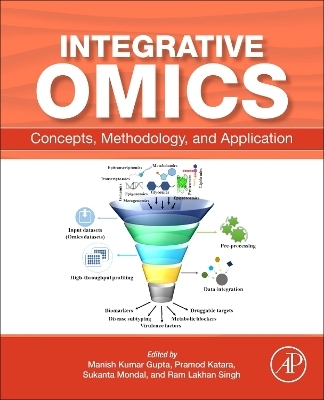
Integrative Omics
Academic Press Inc (Verlag)
978-0-443-16092-9 (ISBN)
Dr. Manish Kumar Gupta is Associate Professor in the Department of Biotechnology at Uttar Pradesh. Dr. Gupta has published more than twelve research papers, published one edited book, five book chapters and given more than twenty-seven invited lectures. Dr. Gupta is life member of various academic societies such as Federation of Asian Biotechnology Association (FABA), Association of Microbiologist of India (AMI), Society of Environmental Sustainability (Founder member) and Indian Science Congress Association (ISCA). Dr. Gupta’s focus of the research work is to extract the key regulatory elements participating in the disease pathways through integrative biology approach. To investigate those, biological tools & databases with big scale data sets generated by state-of-the-art high-throughput technology integrated for computational analysis. Pramod Katara is an Assistant Professor at the Centre of Bioinformatics, University of Allahabad. He has 14 years of teaching and research experience. He has published several peer-reviewed papers and has authored several book chapters. He is a member/life member of several national and international scientific societies and attended many symposia/conferences at national and international levels and presented invited lectures/papers there as well as chairing sessions. He has been actively working in the field of bioinformatics to solve various biological issues with the help of computational omics approaches. His current research is focused on the population-specific human genome and transcriptome analysis to predict the pharmacogenomic variant and solve pharmacogenomics related issues). Dr. Sukanta Mondal is currently working as Principal Scientist, Physiology Division, ICAR-National Institute of Animal Nutrition and Physiology. His major research interests involve cloning, characterization and expression of genes regulating early embryonic loss, molecular characterization and expression of hormone receptors, impact of stress on maternal recognition of pregnancy etc. He has published over 130 research publications in various National/International journals and presented more than 30 papers at various National/International Conferences. He has delivered invited lectures in different conference throughout the country and abroad. He is Associate Editor of journals viz., American Journal of Biochemistry and Molecular Biology, Asian Journal of Biotechnology, Asian Journal of Cell Biology, Current Research in Poultry Science and Biotechnology etc. Professor Ram Lakhan Singh is Vice-Chancellor of Nilamber-Pitamber University, Medininagar, India. He held position of Professor and Chair of Biochemistry at Dr. Rammanohar Lohia Avadh University, Ayodhya, India prior to joining this assignment. He has 31 years of experience as teacher and 39 years as researcher in the area of Environmental and Nutraceutical Biochemistry. Professor Singh published more than 87 research papers, written 17 book chapters and edited 6 books published by Springer, CRC and Elsevier. He guided 25 PhD students and has been invited as editorial board member of International journals. He has been awarded IUTOX Senior Fellowship in 2007 and admitted to the Fellowships of the Society of Toxicology in 2011 and Academy of Environmental Biology in 2015.
From Omics to Multi-integrative Omics Approach
Types Of Omics Data: Genomics, Metagenomics, Epigenomics, Transcriptomics, Proteomics, Metabolomics and Phenomics
Biological Omics databases and Tools
Systematic Benchmarking of Omics Computational Tools
Pharmacogenomics, Nutrigenomics, and Microbial Omics
Proteomics: Present and Future Prospectives
Foodomics: Integrated Omics for the Food and Nutrition Science
Vaccinomics
Integrative Omics Approach for Identification of Genes Associated with Disease
Integrative Omics Approaches for Identification of Biomarkers
Omics Approach for Personalized and Diagnostics Medicine
Role of Bioinformatics in Genome Analysis
Data Management in Cross Omics
Omics and Clinical Data Integration and Data Warehousing
Integrative Omics Data Mining: Challenges and Opportunities
Data Science and Analytics, Modeling, Simulation, and Issues of Omics Data Set
Emerging Trends in Translational Omics
Omics Technology for Crop Improvement
Ecology and Environmental Omics
Current Trends and Approaches in Clinical Metagenomics
Bio-molecular Networks
Machine Learning Fundamentals to Explore Complex OMICS Data
Omics Technology Policy and Society Research
| Erscheinungsdatum | 11.05.2024 |
|---|---|
| Verlagsort | San Diego |
| Sprache | englisch |
| Maße | 191 x 235 mm |
| Gewicht | 450 g |
| Themenwelt | Mathematik / Informatik ► Informatik ► Theorie / Studium |
| Informatik ► Weitere Themen ► Bioinformatik | |
| Naturwissenschaften ► Biologie ► Genetik / Molekularbiologie | |
| ISBN-10 | 0-443-16092-9 / 0443160929 |
| ISBN-13 | 978-0-443-16092-9 / 9780443160929 |
| Zustand | Neuware |
| Informationen gemäß Produktsicherheitsverordnung (GPSR) | |
| Haben Sie eine Frage zum Produkt? |
aus dem Bereich


